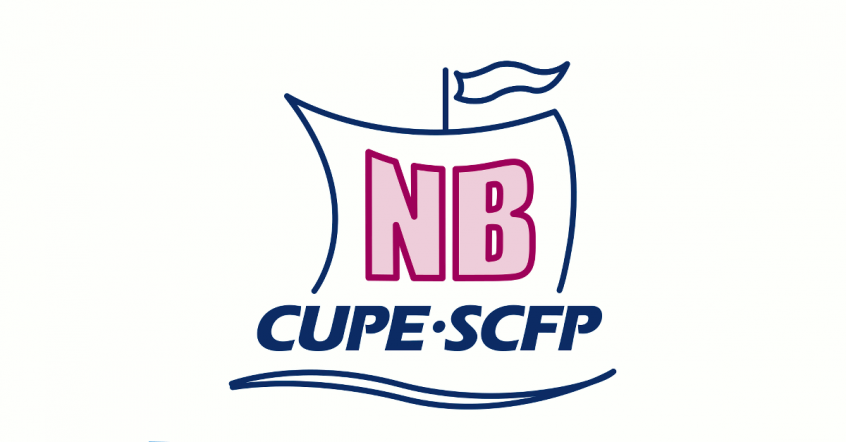Who we are
The Canadian Union of Public Employees (CUPE) is New Brunswick ’s largest union.
With over 28,000 members across the province, CUPE represents workers in health care, education, municipalities, universities, social services, transportation and nursing homes.
A strong and democratic union, CUPE is committed to improving the quality of life for workers in New Brunswick. Through united action, workers won the right to negotiate their wages and working conditions; to stop arbitrary action by employers; and to speak out without fear of reprisal. Together, we fight social and economic injustices in the workplace and in our communities.
Today, CUPE has 6 regional offices in municipalities across New Brunswick. Nationally, CUPE is Canada’s biggest union, with over 700 000 members.
CUPE NB Executive
CUPE NB is led by its members, for its members. It is a democratic organization. The executive of the Division, made up of nearly 20 members elected by members of the Provincial Congress, makes day-to-day decisions.
| President |
Iris Lloyd Illoyd@cupe.ca |
| 1st Vice-President
2nd Vice-President |
Sharon Teare sdteare@gmail.com Serge Plourde |
| Secretary-Treasurer | Kimberly Copp kimcopp16@gmail.com |
| Local 963 N.B. Liquor Corporation |
Jamie Agnew 963prez@gmail.com |
| Local 1190 General Labour and Trades, Part I | Jonathan Guimond jonathanguimond@nb.aibn.com |
| Local 1251 Institutional Care and Services | Chris Curran cdcurran1@live.ca |
| Local 1252 N.B. Council of Hospital Unions |
Norma Robinson normamrobinson07@gmail.com |
| Local 1253 N.B. Council of School District Unions |
Will Thibodeau 1253president@1253.ca |
| Local 1418 Rehabilitation and Therapy and RCPO | Shawna Morton shawna.morton67@gmail.com |
| Local 1840 Provincial Court Stenographer | Jennifer Oliver jennifer.may.oliver@gmail.com |
| Local 1866 Workplace Health, Safety, and Compensation Comm | Tammy Daigle jasper0198@gmail.com |
| Local 2745 Educational Support Staff | Theresa McAllister theresa.mcallister@nbed.nb.ca |
| Local 5017 NB Community College |
Pierre Bourgeois pbourgeois67@outlook.com |
| Local 5026 Collège communautaire du N-B. |
Eric Ravelojaona rav.eric2711@gmail.com |
| NB Council of Nursing Home Unions | Sharon Teare sdteare@gmail.com |
| N.B. Committee of Municipal Workers | Jill Greene Jillgreene24@gmail.com |
| Vice President-at-large / Vice-Président hors cadre | Jason Tower jtower75@hotmail.com |
| Vice President-at-large / Vice-Président hors cadre | Serge Plourde ksplourd@rogers.com |
Standing Committees
- Education Committee
- Health and Safety and Environment Committee
- Contracting-out Committee
- Equality Committee
- Pensions and Insured Benefits Committee
- Women’s Committee
- Global Justice Committee
- Political Action Committee
Our locals
What is a CUPE Local?
A local union, often called local, is the branch of our union located close to where you live and/or work. Locals are typically designated by numbers, for example, CUPE Local 1234. They are made up of members like you and leadership you elect from your within your ranks. You belong to your local, which is within your province.
In New Brunswick alone, there are over 200 CUPE locals of various sizes. The smallest local has half a dozen members while the largest has almost 10,000 members. Across Canada, there are more than 2,382 CUPE locals. Nearly every community in the country has one or more CUPE locals. Many locals or sub-locals are affiliated to a provincial council to help coordinate together their bargaining, campaigns, lobby efforts and much more.
Leadership through membership
Fellow CUPE members are elected to leadership positions within their local. Locals set their own bargaining demands, work with the national representative to negotiate their collective agreement, handle grievances with employers, and decide what issues the members want to support.
|
Name
|
Description |
|
Local 963
|
N.B. Liquor Corporation |
| Local 1190 | General Labour and Trades, Part I |
| Local 1418 | Rehabilitation, Therapy and RCPO (Recreation and Culture Program Officers) |
| Local 1840 | Provincial Court Stenographers |
| Local 1866 | Workplace Health Safety and Compensation Commission |
| Local 1251 | Institutional Care and Services (Correctional and other) |
| Local 1252 | New Brunswick Council of Hospital Unions (NBCHU) |
| Local 1253 | NB Council of School District Unions |
| Local 2745 | Educational support staff |
| Local 5017 | NB Community College |
| Local 5026 | Collège communautaire du N.-B. |
| NBCSU | NB Community Service Unions |
| NBCME | NB Committee of Municipal Workers |
| NBCNHU | NB Council of Nursing Home Unions |
Affiliate
If your CUPE local is not yet affiliated with CUPE New Brunswick, just fill out the following form and send it by email to Kim Copp at kimcopp16@gmail.com
Unionize your workplace
Throughout Canada, workers have the right to join a union and choose a union to represent them when dealing with their employer.
In CUPE the members are in charge. Each CUPE local decides its priorities for bargaining, when to settle a new contract, and how to manage funds. Together we maintain and improve wages and benefits, improve health and safety conditions, and make your workplace better.
There are over 700,000 CUPE members in Canada, and that number is growing. Most of our members work in the public service. We have members working in municipalities, education, health care, social services, airlines, communications, and more.
How to Join a Union In New Brunswick
 Step 1: Contact CUPE
Step 1: Contact CUPE
Call (506-458-8059) or email sdelaney@cupe.ca. Ask to speak with an organizer. He or she is a specialist in labour law and will answer all your questions. All contacts with CUPE are confidential.
Step 2: Sign CUPE Membership Cards
Workers sign cards applying for membership in the union, and authorizing the union to represent them in negotiations with their employer. New Brunswick labour law requires CUPE to collect $1.00 from each worker when they sign a membership card.
Step 3: Card-Check Certification
If between 50 per cent and 60 per cent of workers sign cards, the New Brunswick Labour and Employment Board (NBLEB)may certify the union automatically. If more than 60 per cent of the workers sign cards, the NBLEB will certify the union automatically. Go to step 5.
If between 40 per cent and 50 per cent of the workers sign membership cards, the NBLEB will hold a vote to see if workers want a union.
Step 4: Vote for CUPE
The NBLEB holds a secret ballot vote. Anyone who is in the bargaining unit the union applied to represent can vote. If the majority (50%+1) of workers who cast ballots vote to unionize, the union is certified.
Step 5: You now have a Union : time to negotiate!
The union will serve notice to your employer to begin bargaining your first contract. Your employer and CUPE representatives (including workers from your bargaining unit) sit down to negotiate the collective agreement. This agreement – the union contract – sets out the wages, benefits, working conditions, job security and other rights of the workers.
Remember that local certification process is confidential. Employers are not entitled to know who signed cards. Votes are held by secret ballot. Workers are protected by law from punishment by employers for engaging in union activity. This means that every worker in the province has the right to join a union if they choose. Joining a union means having the power to negotiate your terms of work with your employer, and usually means better pay, more benefits, a safer work environment, and fairness and dignity in the workplace. Union jobs are good jobs, and good jobs grow healthy and vibrant communities.
Join CUPE today, and email an organizer : sdelaney@cupe.ca

